‘It’s hard to stop’: A family watches the invasion of their homeland
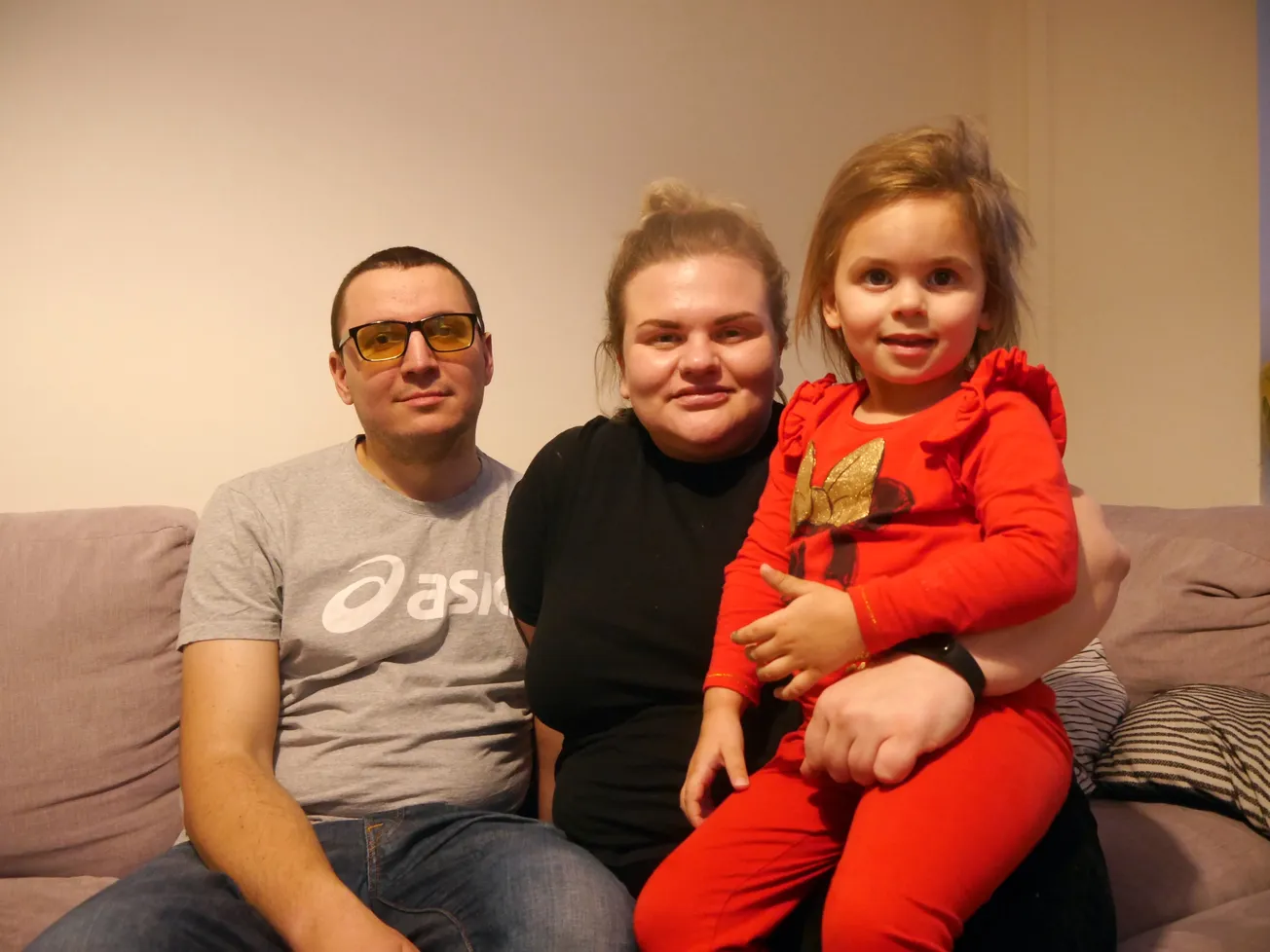
In Huyton, we spend an evening in front of the TV with Roma and Vlad
It was 2am when Roma and Vlad Pasichenko woke up. Sirens were going off in their Ukrainian hometown of Kolomyia and their relatives were getting in touch. The Russian invasion was under way.
Since then, the Pasichenkos, who live in Huyton, have been running on adrenaline, glued to their TV. In their living room we sit and watch 24 Канал онлайн, or Channel 4 Online, a Ukrainian news channel that broadcasts 24 hours a day. Vlad’s mother, who doesn’t speak much English, is feeding her eight-month-old grandson, Mark. There’s some footage of explosions in Kyiv and then she smiles at me and then leaves the room to put Mark to bed.
The couple’s three-year-old daughter Zlata lounges between them. Roma is finding it “hard to stop watching”. “We’ve been talking about that,” Vlad says. “Maybe we need to stop and just switch on something different. Trying to avoid it to get less involved and [feel] less stressful. It's hard because your heart feels worried about your family.” There’s a WhatsApp group chat called Ukrainian Community in Liverpool and it has been alive with minute-to-minute updates of safe places in Ukraine, Poland and Romania that can offer shelter in case someone’s family needs to make a quick escape.
Roma and Vlad were neighbours growing up and became a couple after a decade of friendship. They studied at university in Ivano-Frankivsk together and got married in their late twenties. Three years ago, they left Kolomyia with Vlad’s mother in search of work. When their daughter was born, they called her Zlata, which means golden in Ukrainian.
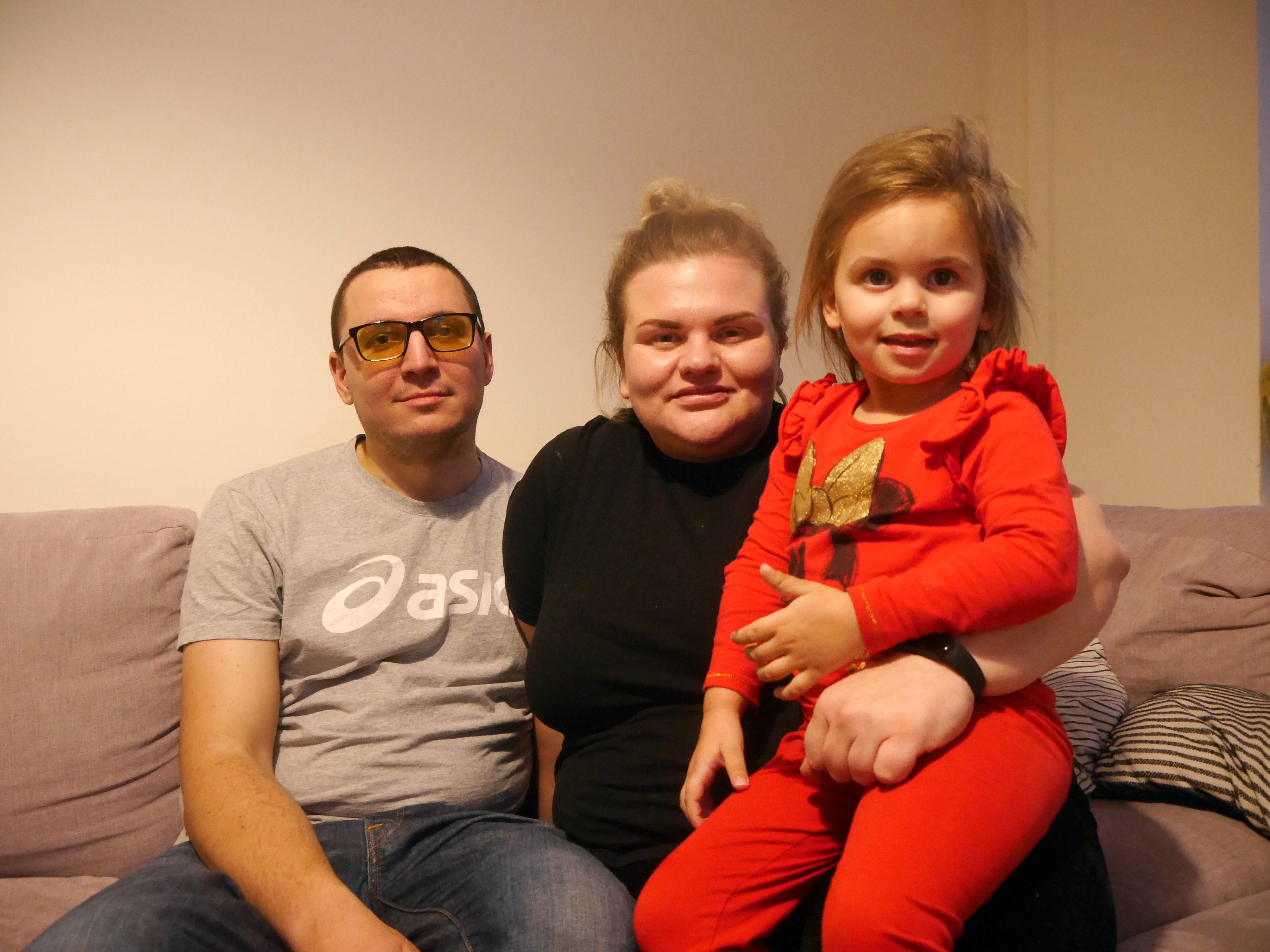
Because of the pandemic and restrictions on travel, they’ve never managed to return to Ukraine since emigrating. They found a two-bedroom flat in Kirkby for the four of them, and Vlad worked as a delivery driver while Roma got part-time work in a warehouse. Just last month, they bought their first home in Huyton, a three-bedroom terrace on a quiet road which reminds them of where they grew up in the countryside. “It’s a long story and we don’t really want to talk about that,” Vlad says, when I invite them to tell me why they left. “But if you work in Ukraine, you will have nothing.”
“But we lived much better than we did before Maidan,” Roma adds. She remembers that after Maidan, or the Revolution of Dignity in 2014, living standards improved for Ukrainians. The roads were better, there was freer access to medicine and education, and there was freedom of speech. “And now they want to take our freedom,” she adds.
Kolomyia is a former industrial town in the foothills of the Carpathian mountains in western Ukraine. It is just 40 miles from Ivano-Frankivsk airport, where Russian missiles struck on Thursday. Because most of the airstrikes are happening after dark, Roma and Vlad’s families have taken to sleeping in the day and staying awake at night. “They are just hiding in their house, and my father-in-law told us everything is prepared for the basement,” Vlad says. “That’s normal now, people hiding in the basement.”
A curfew has been introduced in Kolomyia, and in a nearby airfield a military squad have begun training in shooting anti-aircraft guns. “We are feeling emptiness,” Roma says and her eyes fill with tears. “We can’t help our families because we are so many miles from them. But even if we were there we couldn’t do anything.” And then Zlata runs over waving a Peppa Pig toy, wearing a pink dress and a crown, and her mother gets some emotional respite from one of the most difficult days of her life.
Vlad gently changes the subject. He talks about how welcoming and warm people are here, that Liverpool shares a similar mentality to Ukraine. All morning he has been fielding messages of support from colleagues and friends. One friend, a Russian national who claimed asylum in Liverpool after realising he didn’t believe in Russia, texts to tell them St George’s Hall will be lit up in yellow and blue.
When they lived in Ukraine, Roma and Vlad had a “tiny tradition” with their friends. Every summer they would climb Gerlachovský štít, the highest peak in the Carpathian mountains. Vlad has booked the time off work to go back and hopes they can make it this summer. When he needs to clear his mind, he goes for hikes in the Welsh mountains. It reminds him of the countryside in Ukraine. The common misconception people have is that Ukraine is the same as Russia, Roma tells me. Or that it’s filled with Soviet ghost towns, like Chernobyl.
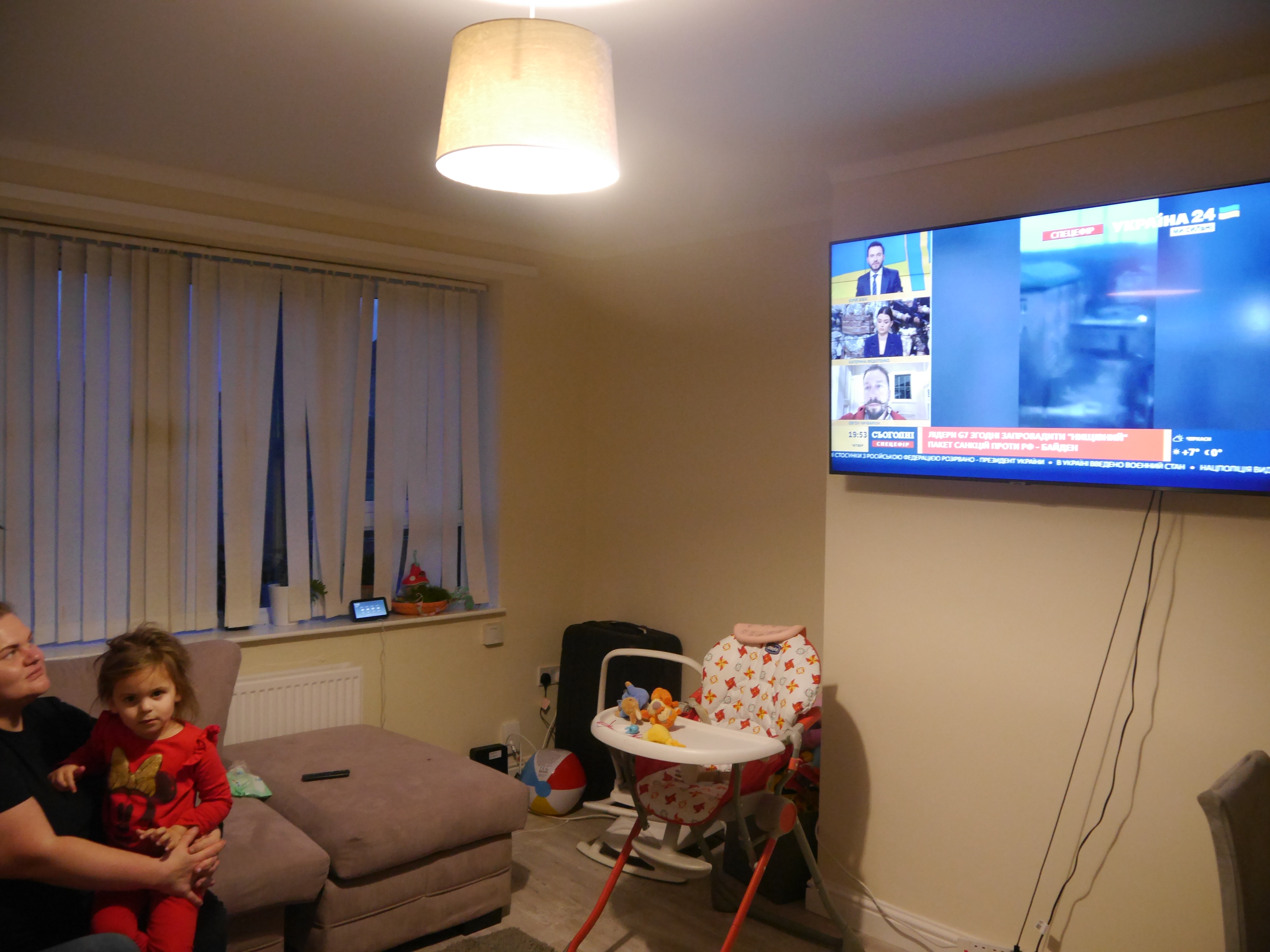
On the Ukrainian news, a well-respected paediatrician is talking. Roma translates: he says the hospitals are in a state of emergency and no one will help. We have been watching for around three hours now and the sun has begun to set outside. “Oh, that’s lot of information for me today, I think,” Roma says. “I think we need to try to sleep a little bit.”
Vlad makes another cup of tea and brings us swiss rolls and we try to talk about solutions. “The best support other countries can give is sanctions,” Roma says. “I think that will really hit him [Putin].” Vlad wants more Russians to protest in the streets and speak out against the regime, but he thinks they are afraid. The next morning, I hear something different and more urgent. When I speak on the phone to a close friend of Roma’s, Ludmila Martin-Roberts, a doctor from Chernivtsi who moved to New Brighton 16 years ago, she says sanctions won’t have an immediate enough impact. “That’s going to take time, and the problem is that during that time, more life can be lost, more places could be destroyed,” she says.
This evening, there will be a divine liturgy to pray for the people of Ukraine at St Oswald’s Roman Catholic Church in Fairfield, led by Taras Khomych, the priest of the Ukrainian Catholic Church of Liverpool. He believes many Ukrainians who are not religious will turn to God. “I cannot understand it yet. It doesn’t feel real for me,” he says. “I cannot imagine war going on there, even though I know the conflict was there, it was always thousands of kilometres in the east somewhere, it wasn’t tangible for people. But now it is so real in my imagination.”
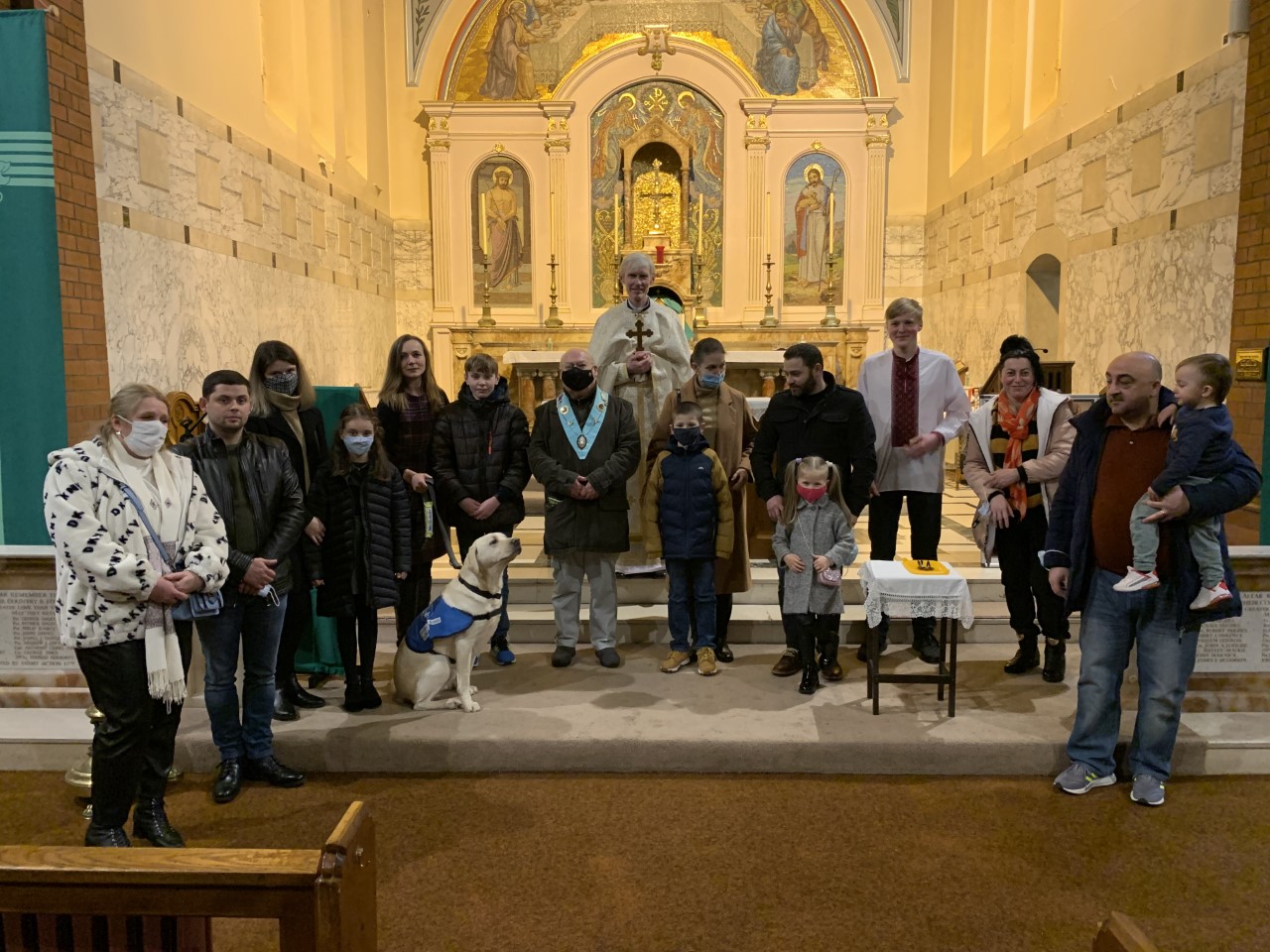
Taras’s mother lives in Lviv in western Ukraine. He called her in the morning to tell her the news — she hadn’t heard — and ask her to take refuge. When we talk that evening, he says he hasn’t heard from her since, and that there have been difficulties with phone connection.
Taras left Lviv in 1999 to study theology in Belgium. When he met his wife — Ukrainian priests are allowed to marry — they started a family and moved to Liverpool a few years later. “Ukrainians love their own country so they do not tend to travel that much,” he says. “So I am not perhaps typically Ukrainian because I have lived half of my life out of Ukraine.”
He likens Ukrainians to birds because although they may leave for a season, they always return. “But with this situation, we don’t know what will happen, there may be thousands of refugees across Europe,” he says.
Ludmila’s parents are currently sheltering two families from Kyiv in their home in Chernivtsi. They are close to the Romanian border, but no one can get across. The UN Refugee Agency estimates around 100,000 people have already been displaced.
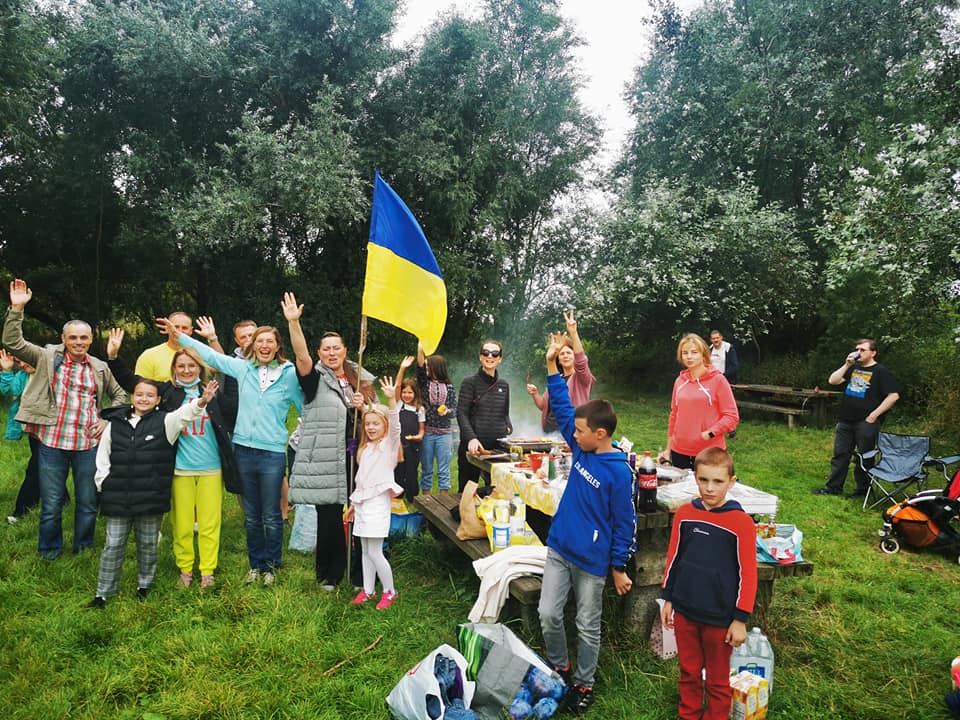
Ewan Roberts, the centre manager of Asylum Link Merseyside, says he’s heard reports of traffic flows of Ukrainian refugees to the West as people try to get out of the path of the invaders. “Whilst I don’t expect a huge rush of Ukranians, I could be wrong,” Roberts says. There are plans in place to recruit Ukrainian and Russian speaking volunteers and increase language class sizes if there’s demand on Merseyside.
On Friday, the UK government announced they are extending visas for Ukrainians who are already in the country whereas Ireland has already waived visa requirements. Roberts says it’s unthinkable that we aren’t doing the same. “How can we encourage Ukraine to fight, send arms, impose sanctions and not open our doors to the people fleeing persecution?”
Every day is a state of war for Ludmila, Taras, Roma and Vlad’s families. Their banking systems have been frozen and a frenzy of panic-buying has left shelves empty. In the last news item before I say goodbye to Roma and Vlad, there is footage of queues of cars on a main road which leads towards a petrol station. The road is lined with pine trees and a flock of birds fly overhead. Roma hopes her family don’t have to leave and can stay safe in their home. If they leave, they won’t know when they might return.

Comments
Latest
Searching for enlightenment in Skelmersdale
I’m calling a truce. It’s time to stop the flouncing
The carnival queens of Toxteth
The watcher of Hilbre Island
‘It’s hard to stop’: A family watches the invasion of their homeland
In Huyton, we spend an evening in front of the TV with Roma and Vlad